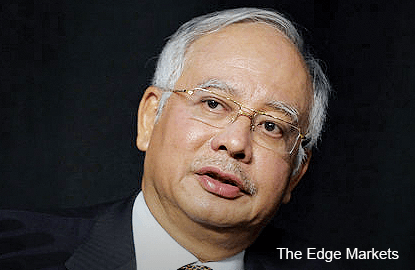
CIVIL servants and pensioners must have slept well on Friday night. For at least a fifth straight year, they are getting a special cash bonus in January.
“To the civil servants, I know that you will have sleepless nights if I do not announce this. I have good news. As a token of appreciation for the commendable service by public servants, I am pleased to announce a special assistance of RM500 to all public servants, and a special payment of RM250 for government retirees,” Prime Minister Datuk Seri Najib Razak said before concluding his Budget 2017 speech last Friday.
Already, civil servants are provided aid for housing and smaller items like a motorcycle, computers and smartphones.
Yet even civil servants and government pensioners must have noticed that the government had been less generous with cash bonuses the past two years.
Like in January 2016, civil servants will get RM500 and government pensioners, RM250, come January 2017. But those tracking these numbers closely would notice that the new year cash bonus for civil servants used to be at least a half-month bonus with RM500 being the minimum instead of a blanket payment. Similarly, pensioners used to get RM500 in Budget 2013 and Budget 2012.
Najib did not say how many civil servants and retirees would benefit from the Budget 2017 “special assistance” or mention how much the “good news” cost the government’s coffers next year.
When tabling Budget 2012 in October 2011, he revealed that RM4 billion was needed to pay one month’s bonus (minimum RM500 each) to 1.3 million civil servants and RM1,000 to 618,000 government pensioners. And that was before the minimum wage was raised.
There were about 700,000 government pensioners as at October 2015 and the civil service is believed to have grown to 1.6 million people.
“Giving bonus is not an issue if the economy is expanding and civil servants see it as an incentive to work harder, raise productivity and improve service quality. However, if it is recurring and civil servants see it as a ‘given’, then it becomes a recurrent expenditure that has to be provided annually. It could be better designed and tied to the performance of each ministry,” says Dr Yeah Kim Leng, an economics professor at Sunway University Business School.
What’s giving some economists sleepless nights, though, is the growing size of the federal government’s emolument and pension bill.
In 2017, emolument and retirement charges (pension) are expected to reach RM99.2 billion, or 45% of projected government revenue. The figure had doubled in the past decade from RM40.8 billion (29.2% of government revenue) in 2007, and will only rise further as more civil servants age and live longer.
More than 40% of government revenue had gone to these obligations since 2014, official data show.
Retirement Fund Inc (KWAP) CEO Wan Kamaruzaman Wan Ahmad told The Edge in an interview January this year that the possibility of moving at least some civil servants to a EPF-like “defined contribution” from the current “defined-benefit” scheme is being weighed by policymakers as part of long-term financial planning. At the time, there was no specific commitment or timeline for a public pension reform.
Experts know the reform requires strong political will and thorough planning.
As a percentage of the government’s operating expenditure, emoluments and pensions are projected to rise to 46.1% in 2017 from 44.9% in 2016.
“We view the level as too high for comfort and is not sustainable as it is expected to eat into the government’s other spending that could benefit the economy in the long run,” RHB Research Institute economists Vincent Loo and Mohd Aris Nazman Maslan wrote in an Oct 21 note.
Emoluments’ share of total revenue alone will be 36% of total operating expenditure next year. “Indeed, it has risen above the 30% level since 2014, from an average of 28.8% a year in 2010 to 2014 and 24% annually from 2000 to 2015, proving that this part of expenditure is tough to reduce due to political constraints. It is also one of its main objectives of reducing the rakyat’s burden caused by the rising cost of living,” they added.
Still, a balance needs to be struck to ensure long-term fiscal sustainability. Inaction would most certainly lead to a nightmare.
Save by subscribing to us for your print and/or digital copy.
P/S: The Edge is also available on Apple's AppStore and Androids' Google Play.